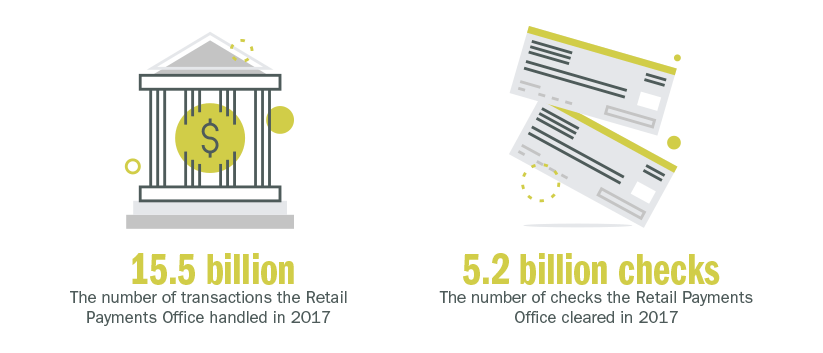
When you receive money through direct deposit, send a mortgage payment online, or deposit a paper check, you are most likely benefiting from the work of the Federal Reserve's Retail Payments Office. The office handles millions of these basic but vital transactions every day. The Atlanta Fed manages the Retail Payments Office for the Federal Reserve System, helping to ensure that money flows through the economy safely and efficiently.
Much of the office's work takes place away from public view. But it is critical. The office processes transactions made through the Fed's automated clearing house (ACH) service, an electronic network that facilitates credit and debit payments between banks. The office also clears checks.
Watch this video: The Fed Explains the Payments System.
"If we don't do our job right, your money doesn't show up in your bank account on payday, for example, and that's not a good thing," said Jeff Devine, a senior vice president in the Retail Payments Office.

In 2017, the Retail Payments Office handled 15.5 billion transactions—with a value of more than $28.8 trillion—through the Fed's own clearing house network, FedACH. Last year, this service processed about 72 percent of the nation's total ACH transactions.
The Retail Payments Office also cleared about 5.2 billion checks in 2017, 40 percent of the nation's total checks. While that is a sizable amount, the number of checks has steadily declined in recent years as consumers and businesses take advantage of more efficient electronic payment alternatives such as ACH transactions.
The Fed, through its 12 Reserve Banks, is the leading provider of payment services to banks. It competes with private-sector parties for ACH and check services, and charges fees that are published on the FRBservices.org website.
The transparent pricing helps set a ceiling for other providers of payment clearing services in the marketplace. "It makes the cost of the transaction between banks clear and acts as a governor on interbank clearing costs," said Devine. "That's one of the roles the Fed plays that helps support the efficiency and stability of the payments system."



